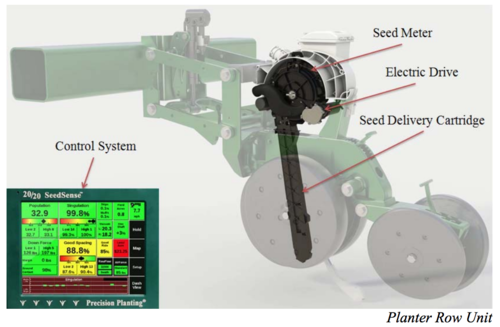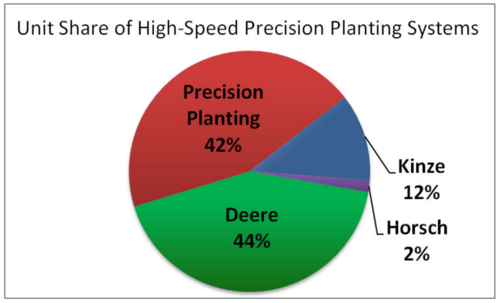 Editor's Note: Todd Janzen, attorney at Janzen Agricultural Law in Indianapolis, grew up on a Kansas grain and livestock farm and now practices law at the intersection of ag and technology. Todd is chair of the American Bar Association’s Agricultural Management Committee and authors a blog addressing legal issues facing agriculture. You can see more posts from Todd at JanzenAgLaw.com.
Editor's Note: Todd Janzen, attorney at Janzen Agricultural Law in Indianapolis, grew up on a Kansas grain and livestock farm and now practices law at the intersection of ag and technology. Todd is chair of the American Bar Association’s Agricultural Management Committee and authors a blog addressing legal issues facing agriculture. You can see more posts from Todd at JanzenAgLaw.com.
The Department of Justice (DOJ) has filed suit against John Deere and Monsanto to stop Deere’s acquisition of Monsanto’s Precision Planting affiliated company. Much has been written in the ag press and non-ag media about this, but I thought it would be helpful to take a closer look at the DOJ’s allegations in its complaint.
What are the DOJ's Claims?
At the center of the DOJ’s complaint are two high-speed planting technologies: Precision Planting’s “SpeedTube” and John Deere’s “ExactEmerge.” Both technologies move seed from planter hoppers into the furrow in a fast, controlled manner. Traditional planters rely on gravity or air to move the seed, which works, but accuracy suffers as speed increases. SpeedTube and ExactEmerge allow farmers to plant at up to 10 mph, approximately double traditional planting speeds.
Deere has 44% of the high speed planting market; Precision Planting has 42%. Two other manufactures make up the rest of the market (Kinze 12%; Horsch 2%). The DOJ argues that if Deere is allowed to acquire Precision Planting, it would have 86% of the market, an almost complete “monopoly.”
Precision Planting also licenses its technology to CNH and AGCO. The DOJ is concerned that Deere’s competitors will be relegated to the back seat once the merger occurs:
Deere plans to structure future product development such that only new Deere planters will offer the best and most technologically advanced solutions, relegating the high-speed precision planting systems that would be integrated in Case’s and AGCO’s planters to a lower tier of quality and features. If the acquisition were consummated, Deere would likely set the price, technology, and go-to-market timing of high-speed precision planting systems supplied to competitors to not undercut its planter sales. This strategy would likely harm Deere’s rivals, entrench Deere as the dominant provider of high-speed precision planting systems, and limit competitive choices available to farmers.

SpeedTube shown on Deere row unit from DOJ's complaint

In sum, the DOJ worries that Deere’s acquisition of Precision Planting will give Deere a monopoly on the high speed planting market and harm competition.
What Law Applies?
The DOJ has sued Deere and Monsanto under the Clayton Act. The Clayton Act was passed by Congress in 1914 as a follow up to Sherman Anti-Trust Act of 1890. At the turn of the prior century, there was a lot of concern about corporate conglomerates having too much power, leading to a lack of competition and increased prices.
The DOJ’s complaint is based upon Section 7 of the Clayton Act, which states that no company shall acquire the stock of another company when, “in any line of commerce ... the effect of such acquisition may be substantially to lessen competition, or to tend to create a monopoly.” The Act is not much more specific than that, but instead leaves our courts to determine whether specific acts constitute violations of the Act.
How Will the Suit be Resolved?
If the DOJ’s interpretation of the Clayton Act is correct, there are a number of possible outcomes. The court could require Deere to divest itself of the SpeedTube technology, creating a spin-off or selling the technology to a third party. The court could require Deere to license the SpeedTube technology to competitors. Or the court could prohibit Deere from acquiring Precision Planting. The court has many remedies available.
Alternatively, if Deere and Monsanto prevail, the Precision Planting sale will go through and Deere will continue to be the dominate player in the US planter industry. The case is pending in the Northern District of Illinois.
Finally, it is worth noting that the suit only involves the high-speed planting technology. Precision Planting has a number of planting technologies that are not part of this dispute.






